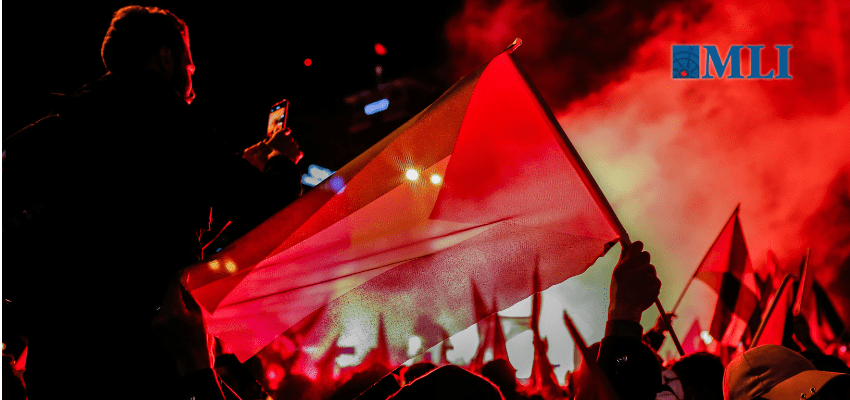This article originally appeared in the National Post.
By Casey Babb, Sepember 16, 2024
Last fall, Jewish university students across Canada faced an unrelenting onslaught of harassment, abuse, violence, and antisemitic vitriol due to the war between Israel and Hamas. Shortly after the devastating terrorist attacks in Israel on October 7 and Israel’s subsequent invasion of Gaza, pro-Palestinian protestors and agitators – including dozens of faculty members – pursued a campaign of disorder, purportedly as a means to draw attention to the plight of Palestinian civilians.
However, for countless Jewish and non-Jewish students alike, who simply wanted a normal school year, this campaign resulted in the most hostile environment seen on university campuses since the Holocaust.
Now, nearing the anniversary of the war, as students and their families embark on another academic year, university administrators, faculty, and support staff must do everything in their power to better protect their Jewish students – students who feel more vulnerable now than they ever have before. Just because last year was an abject failure does not mean this year has to be one, too.
While many argue that what happened on campuses last school year was just another benign episode in a long history of idealistic student movements that have protested everything from racial segregation and the Vietnam War, to apartheid policies in South Africa and economic inequality, Jewish students would beg to differ. Indeed, freedom of expression, the ability to protest, and legitimate social justice movements are one thing. Celebrating the mass rape, murder, mutilation, and kidnapping of Jews in the name of “resistance,” calling for the erasure of Israel, glorifying and even praising listed terrorist organizations, tearing down posters of kidnapped hostages, as well as intimidating, harassing, and assaulting Jewish students is something entirely different.
So, what can be done to ensure this school year is better than last?For starters, instead of teaching students what to think, faculty should get back to teaching them how to think. Universities are meant to be inspiring institutions of higher learning where students are equipped with skills and knowledge that will help them succeed. Unfortunately, though, over the last several years they have become ideological indoctrination centres where professors treat classrooms like an extension of their X accounts as opposed to places of knowledge-building. Too often, students are spoon-fed historical revisionism related to Israel, mis- and dis-information on the true nature of the Israeli-Palestinian conflict, and “facts” which are informed not by empirical research, but by personal beliefs, biases, resentments, and the desire to be liked and popular. This has to change.
Shorter-term and more easily achievable measures should include severe consequences – including expulsion – for any intentionally disruptive activities, or for activities which damage school property. For instance, on August 30, pro-Palestinian protestors at McGill were seen destroying a freshly laid lawn on campus. What consequences will they face beyond the release of some dull statement by school officials? What about the people who, on May 2, set up another encampment at the University of Toronto? Will they be punished in any substantive way? Probably not.
At Dalhousie University in Halifax, students were actually given permission to “miss one class or assessment per course” to participate in the encampments until the end of August. Here is a thought – perhaps students who sympathize more with terrorists than they do with rape and murder victims should not get amnesty to torment Jews and vandalize campuses. Is that too much to ask? Further — why is it that universities seem so averse to relying on their own codes of conduct to punish students and staff who participate in activities which clearly prejudice their institutions? These codes give administrations the power to act — why aren’t they using them?
In addition, we now know many people who participate in these campus protests are not even students. Given that, schools should require proof of identification and enrollment to participate in peaceful protests or activities on campus. Everyone else should be sent packing. Masks and face coverings used to conceal identity should also be banned. The University of California has, for instance, already put in place a ban of this nature. Given there is already precedent in the U.S. for such a ban, why not enforce it on campuses here?
Universities should also work with the relevant authorities to identify and swiftly revoke the study permits of any international students who engage in antisemitic behaviours or break the law. If clear guidelines and policies do not yet exist to enable schools or government officials to pursue this – creating and clearly communicating them to incoming students should be a priority. The revocation of scholarships, grants, bursaries, co-op placement offers, exchange program offers, and other perks and benefits should also be on the table for those engaged in any of this nonsense.
Ultimately, Universities need to wake up to the fact that such overt discrimination and harassment, veiled as something positive or righteous, will, over time, move from destabilizing trollery to the normalization of widespread antisemitism. These behaviours will not remain limited to university campuses. They will permeate throughout our society. In our academic institutions, the pursuit of truth is increasingly becoming off-limits, political extremism is typically accepted and embraced, and well-informed respectful debate is becoming less common, while antisemitism is surging. All of these things are connected — and all of these things need to be fixed before it is too late.
Casey Babb is a senior fellow at the Macdonald-Laurier Institute in Ottawa, a fellow with the Institute for National Security Studies in Tel Aviv, an associate fellow with the Royal United Services Institute in London, and an advisor with Secure Canada in Toronto.






